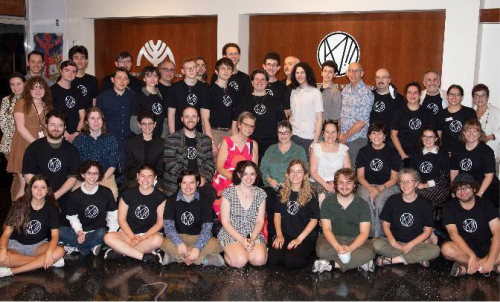A Lullaby from the YIVO Collections
My Little Boy | מײַן ייִנגעלע
- Listen to a folk recording from The Ruth Rubin Legacy: Archive of Yiddish Folksongs (ca. 1940s-1960s)
- Listen to an interpretation from the concert series Continuing Evolution: Yiddish Folksong Today (May 2022)
- Read the lyrics
Morris Rosenfeld, whose poetry often concerned the trials, tribulations, disillusionments and protests of Jewish immigrant life in America for many among its first generation especially, was known within Yiddish-speaking working classes of his time as “the poet of the sweatshop”—a reflection of his descriptions of the often brutally exploitative conditions under which many immigrants had to work to provide themselves and their families with meager subsistence. In 1915, Upton Sinclair called Rosenfeld “the genuine voice of the sweatshop workers.”
Mayn yingele was written in 1887, but its melody remains anonymous. Inasmuch as Rosenfeld also did create some tunes for songs, however, composer and avid Yiddish folksong adherent and investigator Alex Weiser (also YIVO’s Director of Public Programs) suspects after careful consideration that Rosenfeld might have composed the melody as well without ever taking credit for it. Indeed, it was not unusual for poets to invent tunes for their own poetry, especially for their own singing; and that practice is at least as old as the medieval period with regard to Hebrew liturgical poetry (piyyutim), when many paytanim created tunes without musical notation for their own introduction of their poems within synagogue services. In any case, the known tune is presumed to have been attached to Rosenfeld’s poem in America, even though by the 1930s the song (text and tune) had also become known among factory workers in the Soviet Union as well as in Jewish labor-oriented circles in Poland and possibly other areas in eastern Europe.
The poem’s protagonist, presumably an immigrant sweatshop worker, bemoans the fact that he must leave for work in the dark before daybreak and return home only late at night. He thus rarely has a chance to see his little son—his yingele—awake. The child poignantly asks his mother when he will ever see his father (“Where is Pa?”). Depressed and embittered at the loss of those precious years with his family and at being denied the joy of watching his son grow through the stages of childhood, the father gazes upon the sleeping child—who has opened his eyes for just a moment and then fallen back to sleep—and thinks aloud to himself, “One day, when you awake, my child, you will not find me anymore.”
— by NEIL W. LEVIN, Anne E. Leibowitz Visiting Professor-in-Residence in Music
Excerpted from Continuing Evolution: Yiddish Folksong Today (YIVO, 2022)


